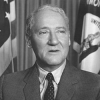John Sherman Cooper

John Sherman Cooper
John Sherman Cooperwas a politician, jurist, and diplomat from the U.S. state of Kentucky. He served three non-consecutive, partial terms in the United States Senate before being elected to two full terms in 1960 and 1966. He also served as U.S. Ambassador to India from 1955 to 1956 and U.S. Ambassador to East Germany from 1974 to 1976. He was the first Republican to be popularly elected to more than one term as a senator from Kentucky and, in both...
NationalityAmerican
ProfessionPolitician
Date of Birth23 August 1901
CountryUnited States of America
The original judgment of the FBI, the Secret Service, and the CIA was that there were three shots. I don't think that convinced us except as a statement by people, many of them who were familiar with ballistics. This question troubled me greatly.
There is no evidence of any kind except that is directed toward Oswald.
I don't think anybody ever thought about the CIA meddling in internal affairs. The shock of the President's death called for an immediate investigation. It actually lay in the jurisdiction of Texas.
We found what we could at that time - the truth. If somebody else can find something else which we didn't find, that, of course, is a duty on their part, as is the truth. It will be the truth.
I am very proud to come back, to speak on the disinterested effort we have made and I believe that, with all due respect, that the decisions we made, when we turned our final report over to President Johnson, will stand in history.
Now, people have said that somebody told them that they saw somebody on the railroad bank or saw somebody going over the bank, but no one has ever been able to show any cartridges, any rifle, any pistol, no one has ever found anything other than the evidence about Oswald.
I think he Oswald felt he was a failure and for the United States and for President Kennedy and all of us. He knew he was a failure at everything he tried, frustrated, with a very sad life, but he was a Marxist.
Our staff not only received the reports from these agencies, they examined them. They questioned them.
Very curious, at the age of about 13 years, Oswald began to study Marxism and he kept on in his writing, affirming that he was a Marxist. Probably he did want to show himself as a great, supreme Marxist.
We provided complete protection to witnesses - right of attorney, right of record, right to cross-examine, and open hearing if they desired. Only Mr. Lane asked for an open hearing.
I would like that to be known; these facts are in the summary which I think is a very good one.
I don't think many people have ever read the report. Who has read 26 volumes of this case? How many read the summary? If you read the summary, it takes a long time.
I must say, to be very honest about it, that I held in my mind during the life of the Commission, that there had been three shots and that a separate shot struck Governor Connally.
The intelligence investigation under the leadership of Senator Church, which I know has helped cause this investigation by you, points out that the agencies did not disclose certain facts to us and that certain plots were going on.